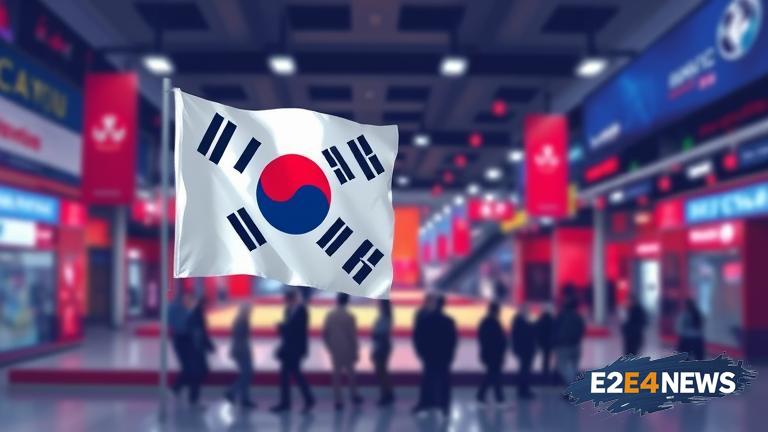South Korea has been at the forefront of the COVID-19 pandemic, with the government implementing various measures to mitigate the spread of the virus. Recently, the country has introduced new measures to combat the pandemic, including increased testing, vaccination efforts, and social distancing guidelines. The government has also implemented a system to track and monitor the movement of individuals who have tested positive for the virus. This system uses GPS and credit card transaction data to identify potential hotspots and prevent further spread. In addition to these measures, the government has also increased the production of COVID-19 testing kits and has distributed them to hospitals and clinics across the country. The testing kits are designed to provide rapid results, allowing for quicker identification and isolation of infected individuals. The government has also launched a public awareness campaign to educate citizens on the importance of social distancing and proper hygiene practices. The campaign includes advertisements on television, radio, and social media, as well as posters and flyers in public areas. Furthermore, the government has implemented restrictions on large gatherings and events, including concerts, festivals, and sporting events. These restrictions are designed to prevent the spread of the virus in crowded areas. The government has also increased the number of hospital beds and medical staff available to treat COVID-19 patients. This includes the establishment of specialized COVID-19 hospitals and the deployment of medical staff from other areas of the country. In addition to these measures, the government has also provided financial support to individuals and businesses affected by the pandemic. This includes loans, grants, and subsidies to help individuals and businesses stay afloat during this difficult time. The government has also implemented policies to support remote work and online education, allowing individuals to continue working and learning from the safety of their own homes. The pandemic has had a significant impact on the economy, with many businesses forced to close or reduce operations. However, the government’s measures have helped to mitigate the economic impact, and the country is slowly beginning to recover. The government’s efforts have also been recognized internationally, with the World Health Organization (WHO) praising South Korea’s response to the pandemic. The WHO has also provided support and guidance to the government, helping to inform its response to the pandemic. In conclusion, South Korea’s new COVID-19 measures are a comprehensive approach to mitigating the pandemic. The government’s efforts to increase testing, vaccination, and social distancing, as well as its support for individuals and businesses, have helped to slow the spread of the virus and protect the health and well-being of its citizens. As the pandemic continues to evolve, it is likely that the government will continue to adapt and refine its response, using the latest scientific research and international guidance to inform its decisions. The government’s commitment to transparency and communication has also been key to its success, with regular updates and press conferences helping to keep the public informed and engaged. Overall, South Korea’s response to the pandemic has been a model for other countries to follow, and its efforts will likely have a lasting impact on the global response to COVID-19. The country’s experience has also highlighted the importance of preparedness and planning, with the government’s investments in public health infrastructure and emergency response systems paying off during the pandemic. As the world looks to the future, it is clear that COVID-19 will have a lasting impact on global health and economies. However, with the right measures and support, it is possible to mitigate the effects of the pandemic and build a stronger, more resilient world. South Korea’s example shows that with determination, cooperation, and a commitment to public health, it is possible to overcome even the most significant challenges.





